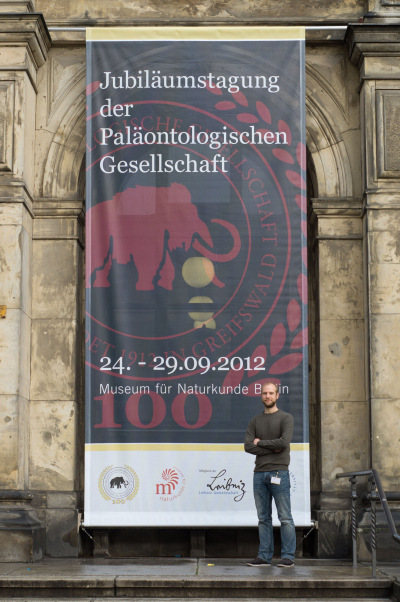Die Inhalte dieser Seite sind leider nicht auf Deutsch verfügbar.
Seitenpfad:
Bremen International Graduate School for Marine Sciences
Sebastian Hoetzel
Report of GLOMAR PhD student Sebastian Hötzel about his participation in the Centenary Meeting of the Paläontologische Gesellschaft, Berlin, Germany, 24 - 29 September 2012
Although the Palaeontological Society is a small society and was, when established one hundred years ago, a society of only German speaking palaeontologists, the centenary meeting was a quite big and international one. Over 400 participants of more than 30 countries met in and around the Naturkunde Museum Berlin, which is closely linked to the German History of Palaeontology. Because of the 100th anniversary of the society, the meeting was opened by the German Federal Minister for Education and Research Annette Schavan. She pointed out the importance of Palaeontology e.g. in answering questions concerning future climate and biodiversity crises.
The over 30 symposia during the conference were very diverse and covering a wide field but mostly very detailed questions of palaeontological issues resulting in very specific talks and posters. My oral presentation was set in the symposium “The Evolution of Modern African Biogeography” fitting perfectly to my PhD topic. It was interesting for me to hear about newest results concerning the evolution of animals of the African continent and its link to climate. My presentation about vegetation change and savanna expansion of the late Miocene to Pliocene was the only talk about vegetation within the session. However, I received many positive feedbacks about my results and interpretations. Despite my symposium I especially enjoyed the symposium “The development of Modern Vegetation Belts during the Cretaceous and Tertiary”, e.g. the keynote by R.A. Spicer about cretaceous terrestrial climates and vegetation.
This conference especially the symposia I participated actively was a great opportunity to present my results. I was able to meet other scientists focusing on the evolution of life as impact of climate changes (in Africa) and deepened my general palaeontological knowledge.
I thank GLOMAR for funding my conference participation giving me the opportunity to present my results and to get new inspiration due to the scientific exchange during the talks, discussions and social activities.
The over 30 symposia during the conference were very diverse and covering a wide field but mostly very detailed questions of palaeontological issues resulting in very specific talks and posters. My oral presentation was set in the symposium “The Evolution of Modern African Biogeography” fitting perfectly to my PhD topic. It was interesting for me to hear about newest results concerning the evolution of animals of the African continent and its link to climate. My presentation about vegetation change and savanna expansion of the late Miocene to Pliocene was the only talk about vegetation within the session. However, I received many positive feedbacks about my results and interpretations. Despite my symposium I especially enjoyed the symposium “The development of Modern Vegetation Belts during the Cretaceous and Tertiary”, e.g. the keynote by R.A. Spicer about cretaceous terrestrial climates and vegetation.
This conference especially the symposia I participated actively was a great opportunity to present my results. I was able to meet other scientists focusing on the evolution of life as impact of climate changes (in Africa) and deepened my general palaeontological knowledge.
I thank GLOMAR for funding my conference participation giving me the opportunity to present my results and to get new inspiration due to the scientific exchange during the talks, discussions and social activities.



